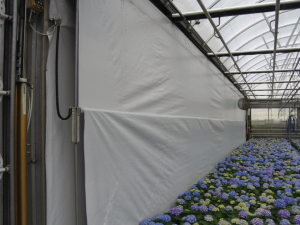Add energy curtains to your greenhouse walls for a good payback!
Investing in energy curtains for the walls of a greenhouse can provide a rate of return on investment of 30% or more. With new greenhouses being built with a gutter height of 16 feet high or greater, the ratio of wall area to roof area is resulting in greater heat loss. For example, a 20,000-square-foot greenhouse with 16-foot height to the gutter will have about 30% more wall surface area than a standard house with 12-foot high walls.
Most of these new houses have one or more energy curtains to insulate the roof area, resulting in the heat loss through the walls being greater than through the roof. If the above house was glazed with double polycarbonate it would require about 428,000 BTU/hr for the uninsulated wall area and only 309,000 BTU/hr for the roof area with a double screen on a night with a 60° F temperature difference between inside and outside. If the walls were glass, the savings is considerably more.
The systems for insulating the walls have improved over the last few years. A system using a center motorized curtain roller is common, faster and more efficient, and stays straighter than rolling from the top only. The gearmotor unit with a large ratio rotates the shaft. It can be located on one end of the shaft for short greenhouses or in the center for long ones. Depending on weight and design, curtains as long a 450 feet can be rolled by one gearmotor. Safety torque and limit switches protect the motor.
 There are two common types of curtain materials that will provide good energy savings. Both are polyolefins that have good strength properties needed for rolling and are fire retardant to meet the safety standards in the horticultural industry.
There are two common types of curtain materials that will provide good energy savings. Both are polyolefins that have good strength properties needed for rolling and are fire retardant to meet the safety standards in the horticultural industry.
One is a clear fabric, L.S. Svensson — (Luxous 2845), that has good light transmission so that it can remain in place both day and night. It allows about 78% light transmission and has good light diffusing properties to allow sunlight to penetrate into the plant canopy. Tests show that it will have about 45% energy savings.
The second is a blackout material (L.S Svensson — Obscura 10070) that provides greater energy savings and also daylength control for crops such as poinsettias, mums and cannabis. It is laminated with white surfaces on both sides to reflect summer heat away from the greenhouse and reflect supplemental light back to the crop area. It blocks 99.9% of the light and provides 70% energy savings.
The typical cost of a motorized screen system is $2 to $5 per square foot, depending on the size of the installation, screen material used, number of obstructions that have to be worked around and ease of maneuvering man-lifts in the greenhouse. For a wall curtain with a transparent material that is not opened and closed fequently, a manual winch system may be all that is needed, saving about $1,000 for the gear motor and control.
Investing in energy curtains for the walls of a greenhouse can provide a rate of return on investment of 30% or more. With new greenhouses being built with a gutter height of 16 feet high or greater, the ratio of wall area to roof area is resulting in greater heat loss.
Based on the calculations from my energy audits, the payback for wall screens is between two and three-quarters and five years depending on the fuel price, location of the greenhouse, type of wall glazing and temperature at which the greenhouse is operated.
Wall curtains need to be installed to provide a tight seal all the way around the edges to prevent the cold air next to the wall from draining down and into the growing area. A fixed seal of polycarbonate sheets or fire resistant screen material is frequently installed to create the seal.
Incentive payments from the USDA’s Natural Resources Conservation Service or Environmental Quality Incentives Program, or a State Farm Energy program can help defray the installation costs. Low-interest Federal loans are also available for some of the remaining cost.
